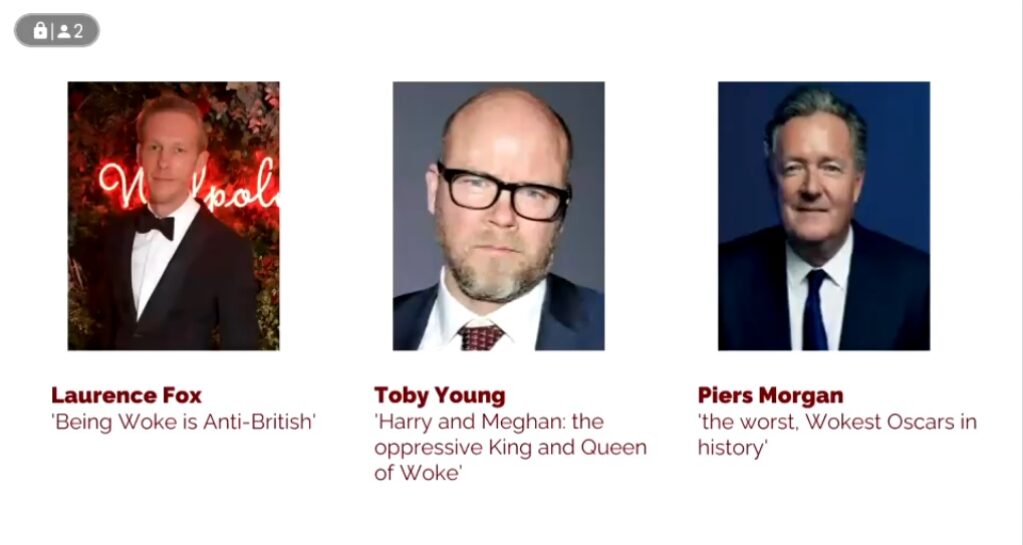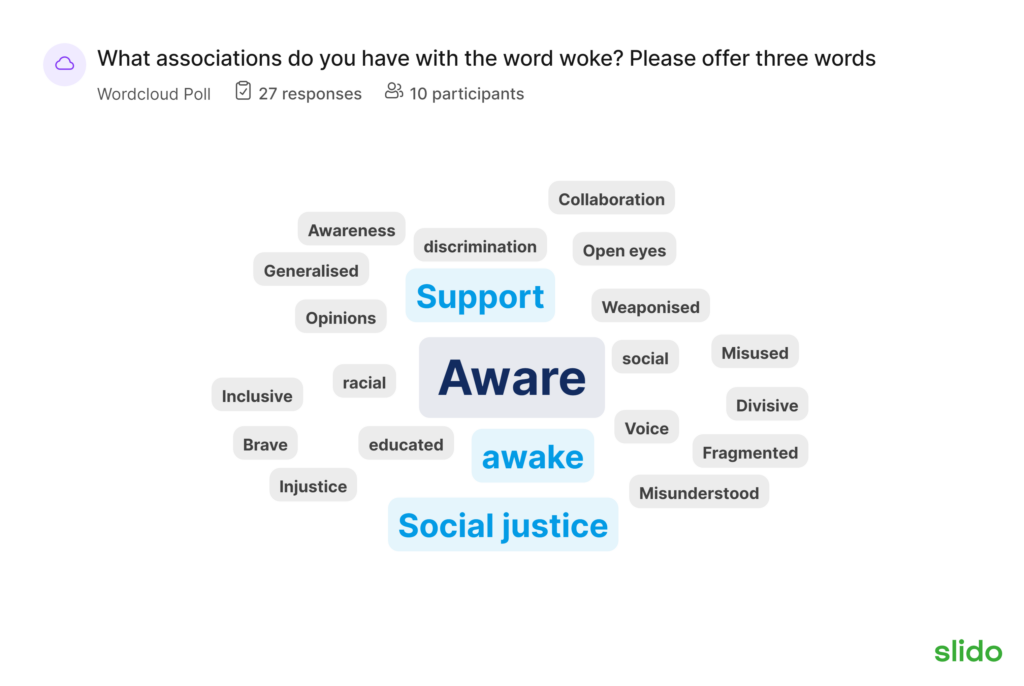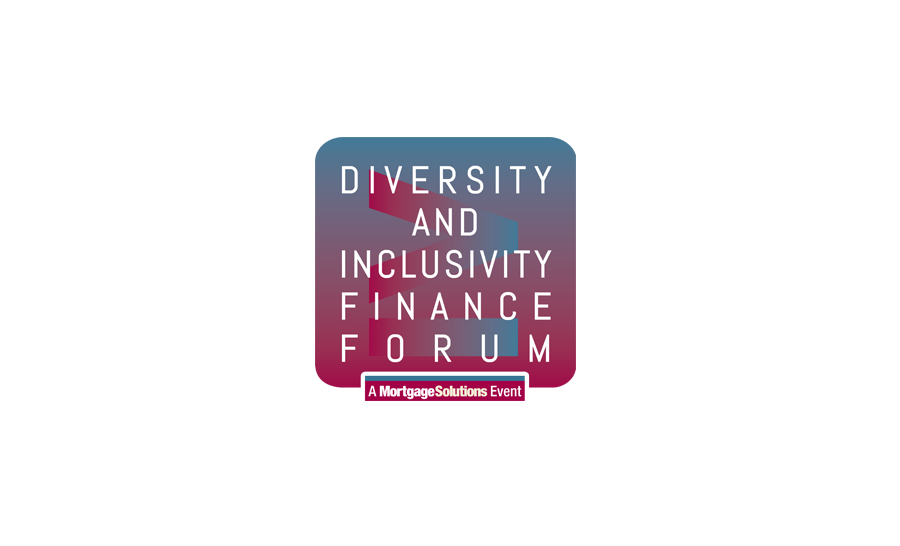
Panel (from left to right):
Julia Hartley-Brewer, political and current affairs writer and broadcaster [JHB]
Dawn Morton-Young, diverse leaders’ coach, speaker, consultant [DMY]
Andrew Pilkington is Professor of Sociology at The University of Northampton and a Fellow of the Royal Society of Arts [AP]
Russell Quirk, co-founder, ProperPR, GB News commentator and Talk TV host [RQ]
“The word ‘woke’ has been misunderstood from the jump’ in the UK” said keynote presenter Dawn Morton-Young.
It emerged in the 1930s from the Black American community as a warning to stay aware and alive to the everyday potential dangers of widespread racial discrimination and the resulting unfairness and social injustices.
Morton-Young drew out the sharp cultural distinction between the black experience for those living in the US and the United Kingdom, suggesting the fondness for the Empire often typical of those who emigrated to the UK was far distinct from the slavery experience of the US, despite the resulting racial problems that unite them.
The hashtag #StayWoke emerged in 2014 as part of protests after the killing of Michael Brown and the Black Lives Matter movement, which is when woke culture was born. White allies acknowledged the term alongside other groups, including the black transgender and women’s movement, becoming a wraparound term for the recognition of any type of social injustice by 2019.
“Something important happened then, as the term started to be used more widely and where the conversation by LGBTQ+ and trans rights became so prevalent, the ridicule and weaponization of ‘woke’ began because it remains such a polarising topic,” said Morton-Young.
Subsequently, the Florida government led by divisive figure Governor Ron DeSantis declared a ‘war on woke’ and the term itself became anything to do with the fight against supposed ‘cancel culture’, or political correctness ‘gone mad’.
Meanwhile, in the UK, several commentators and ‘most vocal and listened to’ users of the anti-woke weapon emerged including Laurence Fox, Toby Young and Piers Morgan, with many of the current government including ex-PM Boris Johnson and Home Secretary Suella Braverman using similar tactics.

“So now a term invented to allow people to self-protect is now looked at with a roll of the eyes, a sigh, even a snigger,” said Morton-Young.
As with the word queer and its reinvention by the gay community, the solution is to take back the narrative and embrace the term, but ‘make it empowering rather than divisive,” she added.
“We are woke, so we won’t turn a blind eye to the injustices in the world is the way I would sum it up.”
Debate highlights from the Leadership and Executive events
Andrew Pilkington, professor of Sociology at The University of Northampton and a fellow of the Royal Society of Arts [AP]: “This characterization of political correctness (PC) and woke is highly influential and clearly resonates with many people.
“A 2020 CSS poll presents a broadly similar picture, with ‘six in ten’ agreeing that political correctness gives “too much power to a small minority of people who like to take offence” and nearly eight in ten agreeing ‘that “you have to walk on eggshells when speaking about certain issues these days”. Over eight in ten agree ‘that “too many people are easily offended”. The media in short portrays political correctness in a derogatory fashion and most people buy this picture.”
Julia Hartley-Brewer [JHB]: “I get called a racist, transphobic, bigot, xenophobic, I can’t keep up with the number of things I get called online. Woke is the exact opposite of what it set out to be. Anyone who doesn’t think racism or sexism shouldn’t be overcome probably isn’t a very nice person, probably not very bright either is what I’ve always thought. It isn’t political correctness gone wrong its political correctness in hyper drive, Orwellian thought police territory.
“Woke is about feelings mattering more than facts. It’s about seeing people only as their sexuality or identity, that those are the most important things about you. For me woke is the opposite of progressiveness, it is regression, it is thought control and needs to stop.”
Dawn Morton-Young [DMY]: “The term woke has been hijacked – the problem we have is that until society moves away from being bigoted, that is what I am first before anything else. I am treated as a black woman by people who seek to marginalise me. Until society changes it is very hard for me to just blend in with everyone else and be the same because we are not treated the same.”
…
(Debate host) DMY: “Confusion about the difference between demands and rights – trans people can make demands to play as a woman in sport but it is not a right to do so. Others make demands to pull down the statue of a slaveowner, but it is not a right. How can we start to understand the difference?”
JHB: “Just because someone feels strongly about something, it must be done and if you disagree you are a bad person and a supporter of the slave trade. One of the big issues with woke culture is this rewriting of or destruction of the past. The compromise might be for the statue to stay up with a plaque explaining the context. It would be stupid to suggest there is no problem here to a black woman. That would be insulting and stupid.
“But to ignore how different attitudes are today and the incredible progress we have seen in this country. This idea though that it’s all the same as it has always been. Every statistic shows that this country is one of the most accepting in the world. This idea that Indian people face racism, that women face sexism, gay people face homophobia and that its just as bad as it has always been. Every single person is different. To ignore how much we have changed and suggest it’s the way it was in the 1950s is an insult to most British people.”
DMY: “I agree there has been progression. But we saw the recent report on the Metropolitan police which confirmed its institutional racism and homophobic and this is twenty thirty years since Steven Lawrence, murdered in 1993. This is the institution that enforces our laws.”
AP: “Both are true aren’t they? There has been significant progress. The British attitudes survey reveals there is progress but at the same time significant inequalities remain.”
…
AP: “History has always been rewritten hasn’t it? Historians have become more sensitised to gender and race producing women’s history, black history so they reinterpret the past. I personally think it’s reasonable for institutions to think back about their roles in slavery and reinterpret that history. I think that’s a reasonable thing to do. On statues, they’re in the public arena. It’s a trivial issue, I’d rather more serious substantive issues were addressed rather than symbolic issues.”
JHB: “Revisiting history from a raft of different perspectives is not rewriting history. None of these things is pretending the history that happened didn’t happen. This is suggesting we should judge history with the values we have today. We can’t judge things that happened five years ago with the values we have today because things have changed so much. Five years ago we knew what a woman was, and whether she had a penis or not. That’s changed now apparently for a lot of people and a lot of our politicians.”
Esther Dijkstra, managing director intermediaries, Lloyds Banking Group [ED]: “It comes across to me Julia that you are normalising a lot of the behaviour in society today and that feels very dangerous. A lot of behaviours are still sexist, racist, homophobic and you make me feel like it’s ridiculous to challenge that directly and upfront and I find that quite scary.”
JHB: “What behaviours?”
ED: “You make it sound like its acceptable. You emphasise that debate should be about facts not about feelings but a lot of this is about feelings as well. That’s how we make decisions.”
JHB: “Is that your feeling or is it something I said? If you feel things are just as bad for women right now as they were in the 1950s and I show you 30 facts as to why that may not be the case. Of course, things are not always equal and there are still examples of sexism, but if I can present some facts to show your feeling is ‘misinformed’ would your feelings still trump my facts?”
ED: “Yes.”
JHB: “And that’s the problem with woke. Feelings trump facts and they shouldn’t.”
DMY: “I think it’s about not ignoring people’s experiences. That was the problem with the Sewell report.*
“When I look at my community, my friends, my family, people that I know, for the people on the ground, a lot of people felt that way. I don’t think it’s about feelings trumping facts, it’s about experience. It may not be as bad for women now as it was in the 1950s but if I go into a meeting I know the assumption is that I am there to take notes or make the tea.”
…
JHB: “I would always nowadays use the term partner, not husband or wife. (To William Lloyd-Hayward, group COO, Brightstar [WLH]) Would you feel insulted if your 80 year old aunt asked you if your wife was with you?
WLH: “Every person would be different. I wouldn’t be insulted. A lot of people would say what does your partner do, where does your partner live? What is insulting, take the adoption process. Factually, right now, from the government, as we go through this process, one of us has to be determined to be on maternity leave and one of us has to be determined as on paternity leave. So my husband has to be defined as the woman receiving benefits and I have to be defined as the man receiving benefits. That’s what’s offensive. It’s the institutions that are failing to recognise the changes.”
JHB: “That’s an easy thing to change.”
WLH: “It is easy. But it’s not happening.”
…
Alison Hoghton-Corfield, national relationship director at Master Private Finance: “I have spent a lot of time in Liverpool and we talk about eradicating our colonial past. This may be controversial but I’m not a big fan of it. I agree with what Julia said about these statues staying up, but making it crystal clear about what these people did wrong in the past. In Liverpool, we have a museum of slavery and if you ever get the chance, go to it because it is a fascinating museum..
“Liverpool made fantastic money from the slave trade, which is abhorrent and embarrassing, but I’d never ever want to see that museum become something else because we have to learn from our mistakes.”
…
JHB: “A view I find very difficult, is that when we have an Asian heritage prime minister and a black heritage foreign secretary (Rt Hon James Cleverly) it’s seen as job done. I’m not remotely suggesting that. But we have women, Asians, black people in positions of authority. Growing up in the 80s, with Thatcher, people thought being prime minister was just a woman’s job.
“But when there is a black home secretary or an Asian prime minister, they’re the wrong kind of Asian and the wrong kind of black – or with Theresa May or Thatcher they’re the wrong kind of woman. This is something that is constantly thrown out there that you are supposed to have certain views and behave in a certain way or have a certain kind of policy so tick certain boxes. And that’s what I don’t like. The expectation that if you’re black or a woman you must have certain kinds of views. The whole point is to not judge people on those things.”
DMY: “I agree. But we discussed the Sewell report earlier on which also focused on the social and economic inequalities out there. Those names you’ve mentioned are from a different social class to the majority of people of colour. I’m not sure about the foreign secretary, but Rishi Sunak, whether he would understand the plight of other Asian communities around the UK is debatable.”
…
JHB: “When children go to school today, all they hear about is this awful awful, white country that did awful, awful things..Every Empire in history carried out horrible brutalities and had slavery as the norm. It doesn’t make it ok, it doesn’t mean we should whitewash it, but that’s a fact and facts trump feelings. I’m sorry but they do.”
Dom Scott, managing director, Lifetime Connect [DS]: “Julia. It shocks me that you’re able to get away with the opinions and comments that you have. What strikes me is that you are incredibly intelligent and able to use really clever devices to navigate your way out of the incorrect things that you say.
“There are a number of things but the point about slavery..One of the things you said is that Britain ended slavery. That’s reductive. The slave trade was ended in 1807 – slavery continued until 1833. The reason it came to an end is that Britain had an advantage over all of the other empires. It realised if it stopped others from building their own slave economies Britain would retain the advantage. It also had the monopoly on slaves who were born into slavery, so were far more subservient than those fresh from Africa. So for you to say Britain ended it because they thought it would be a good thing is completely wrong..
“There are a few other things you’ve said, which are completely wrong. History is a collection of opinions, but where any facts are wrong, they need to be corrected. And there are a plethora of them which are baked into the education system.”
“Another thing you said is people shouldn’t live by how they self-identify. The most pertinent point that comes into people’s minds when I walk into a room is that I am black and there can be a negative connotation around blackness. For me to not lead with that would be wrong because there is a self-defence mechanism. There is a distinct possibility, based on the data you say you trust, that my children are more likely to be sentenced or arrested, or get a longer sentence if incarcerated so for me to not lead with that would be to raise children who do not have that pertinent thought at the front of their minds. That would be remiss of me.
“On a basic level if someone asks you, do you feel hot? Someone’s feelings are really important. They are anecdotal facts that are really important.
JHB: “If someone says it feels like 40 degrees in here, but someone has a thermometer and says I can show you its 20 degrees in here, which wins? That’s what I mean.”
DS: “The way that facts are collected are often at the mercy of a distorted premise alongside how those are presented. I think it’s wrong that people who don’t have a voice, don’t have privilege or the ability to collect data in a way that’s satisfactory to you be silenced when they share their experiential data, which we call feelings in order to describe the problems they see.”
…
DMY: “When I was first asked to moderate and speak about the word ‘woke’ I thought, O God, because for me it is not about the word woke.
“In fact, I don’t like it. We should just obliterate it or ignore it because at the core of it, what we’re talking about is having an awareness, not turning a blind eye and being prepared to make impact against injustices in the world.
“Forget about the word woke. The question is, what do we need to do to progress?”
…
AP:” The consequences of the culture wars are disturbing in so many ways. Firstly, they distract attention from substantive issues. The Black Lives Matter movement highlighted the importance of addressing structural racism, but the impact of stories about Rule Britannia being played but not sung at the Proms and pulling down historical monuments with racist links ‘is to reframe the whole Black Lives Matter movement as being primarily about issues like this. This leaves the casual observer thinking “all these street protests because you don’t like old songs or statues?”.
…
Russell Quirk, PR, Proper PR [RQ]: “I agree that ‘woke’ has been hijacked as a pejorative** term. Where I disagree is that I think it has been hijacked by the left and not the right.
“Piers Morgan’s views are not as right wing as many may suggest. The politically correct movement has gone way too far. We end up in a situation where Disney World won’t use the words ‘men and women’, Sadiq Khan, the Mayor of London has suggested people within the GLA shouldn’t use the term man or woman. We have trans women in sport competing against people who have spent years training to get to their position being trumped by a man who now calls himself a woman…”
DMY: “I agree with you that ‘woke’ has been hijacked by the left. But all of the examples that you gave were all around the trans agenda. It is different. When it comes to gender. This is a new concept for all of us. We’re talking about fundamental concepts – what is a woman, what is a man? – and it’s a debate that needs to be had separately in general because although very relevant, it’s very polarising. Using this example, as to how ‘woke’ has been weaponised by the left, by just focusing on a single group makes it a very difficult topic to debate sensibly.”
RQ: “It’s two sides of the same coin. It’s the same thing. My daughter was taught at her grammar school two weeks ago that there are 75 genders. She was taught this by a teacher..Whether its gender, whether its ethnicity, misogyny, whether its homophobia, it’s the same thing.
“People in the coffee room upstairs have said today they are too scared to speak their minds. I believe in freedom of speech. What kind of a society are we where we can’t say what we think? Or we can’t say something we think might be offensive just in case we’re fired or cancelled.”
AP: “Your example is a transgender one, because it is the most toxic issue in this country, which fits your case best. It’s the most polarising issue.”
….
RQ: “We’re far less racist now than we were 50 or 100 years ago. We’re very, very diverse as a country. Very accepting of ethnicities, migration. We’re in a far better place than we’ve ever been.”
DMY: “What you’re saying is because we’re not lynching people now, but allowing them to work, everything’s ok? You’re suggesting everything is better. The top one per cent of companies do not have any ethnic minority board members, how have we progressed?
AP: The attitudinal data does show that as a country we are more liberal, there has been some progress. But the report on the Met which came out this year suggests exactly what McPherson said in 1989. These aren’t left wing, ‘woke’ people. These are people who completed reports and concluded that the Metropolitan Police was and is now institutionally racist.”
DMY: (To RQ)“What you should find disturbing is that two reports on the police 33 years apart have come out with exactly the same conclusions – and you’re suggesting that we’ve progressed?”
…
AP: “The war on wokeness and PC does not merely reflect the world but re-presents it. It constructs wokeness and political correctness so that those subject to the discourse can see its pervasiveness and discover it all around them…
“This discourse has proved very persuasive and underpinned the success of the Brexiteers in the EU referendum and the advent of Trump to the American Presidency. This has given succour to those who wish to go back in time and conjure up an imaginary past – Take back control for the Brexiteers; Make American great again for the Trump supporters.
“The world is in the process turned upside down, with antiracism and feminism seen as the problem rather than racism and sexism, and, despite the manifest evidence on racial (and gender) disparities to the contrary, white men seen as victims. In other words, the anti-PC discourse comprises an ideology which delegitimizes a social justice agenda and gives people permission to remain locked in their prejudices.”
Post-event, we asked attendees to offer the three words they most associated with the word ‘woke’ producing this word cloud below:

Five key takeaways from the DIFF event
- The word ‘woke’ emerged from the black community in the US in the 1930s to describe a state of alertness to the constant racial threat ex-slaves had to endure
- The ‘anti-woke’ focus on statues or lyrics at the proms are deliberate distractions from the bid to progress diversity and inclusivity
- Feelings are dismissed for being of less value than facts. But when real-life experiences offer the only body of evidence available, feelings and experiences remain relevant
- Use of the transgender debate to prove anti-‘woke’ theory is constant. The debate is so divisive and immature it is used as a dog-whistle tactic to derail real debate on this and other injustices including sexism, racism or homophobia
- The word ‘Woke’ has become weaponized, so simply, never turn a blind eye to injustice and ask yourself how can we change for the better?
*The Sewell Report: The Commission on Race and Ethnic Disparities
The report was widely criticised. Doreen Lawrence, who campaigned for justice for 18 years after the murder of her son Stephen by racists, warned that the Sewell report risked pushing the fight against racism “back 20 years or more” for undermining the existence of structural racism. The Guardian, March 2022
** contemptuous or disapproving


















